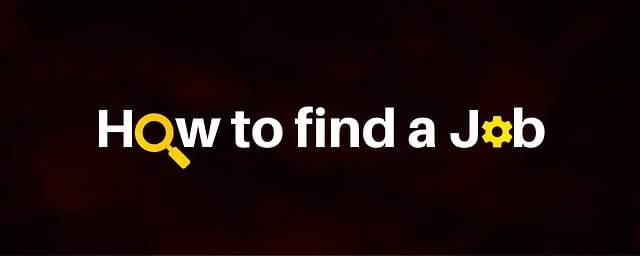After completing a degree or diploma, the number one priority for these youngsters is finding a job. However, they still struggle, and that's why most of them turn to Google to search for how to find jobs...
In this article, I'll tell you about three important, little-used strategies that will give a major boost to your chances of finding work.
If you're looking for a job, I don't have to sit here and tell you that it's not the easiest thing in the world. But…
It's not even the most difficult; far from it. Indeed, if you use the right strategies, finding work is just a matter of time, usually a short time.
Let's see the 3 Strategies ...
1. MAKE YOUR CURRICULUM STAND OUT
Imagine this scene: on the recruiter's desk, there is a pile of resumes covering the keyboard, hundreds of sheets, each more identical than the next. The phone rings, customers arrive, payroll needs to be done. At the moment, the last thought of the employee is to read all the CVs. And yours is lost there in the middle, in the mass.
This is the reality that confronts employers more and more often, and for this reason, any anonymous CV that is the same as the others has no point in existing; it will be thrown away even before being read because it does not attract attention. Your resume needs to scream, 'STOP! Stop what you're doing and read me now!'
There is no point in searching for how to find jobs if you're repeating the same mistakes of making less worthy CVs.
Here are three tips for creating a resume that catches the employer's eye and will boost the chance of it being read immediately by 3-5 times, instead of being placed in the ever-growing 'to-read' pile.
- Use A Clear And Clean Template
Most candidates use the same CV recommended by their friends or the traditional one. I have friends who made CVs that attract the eyes of people from 2km away; the CVs were flashy. However, this is a mistake. If you choose these kinds of templates, it might distract the employer from the content. Perhaps that CV format was created by someone who has evidently never had to look for work in their life; otherwise, they would have conceived something at least watchable.
Avoid these templates because:
• The information is arranged more or less randomly, making it difficult to read quickly.
• There is so much useless information that finding your strengths is like finding a needle in a haystack.
• They cannot be customized to your needs and experience.
• The info is all over the place, making it hard to read fast.
In any other situation, it's preferable to use a clear and concise template (1 page or 2 if you have a lot of experience) that you've developed.
- Print On Thick Heavy Paper
This is a trick that I have never seen in my life, despite having reviewed my recent CVs. However, every time I have recommended it to a friend, the results have been extraordinary. So, pay attention.
Common photocopy paper weighs 80 grams per square meter, sometimes 70 grams, the slightly heavier one 90 grams. Well over 99% of all printed documents are on this weight, and that's boring.
Why not use thicker paper? Purchase sheets of 120 or 140 grams per square meter to give your CV that pleasant 'light cardboard' effect. For example, advertising flyers are often printed at 140 g/m2 — the feel in the hand is much better, don't you agree?
When an employer picks up a 140 g/m2 CV, he will instinctively want to read it because something like this has never happened to him. Insured figure.
- Write An Effective Cover Letter
The cover letter is often skipped by many candidates. In reality, it is perhaps even more important than a CV as a tool to get noticed.
The reason is that a cover letter can and must be personalized for each individual submission, unlike a CV, which needs personalization only for each sector in which you are looking for work. Furthermore, the letter is read more easily because it flows better. So, writing an effective one that highlights your strengths is essential if you want your CV to be read immediately.
Here's how to write a good cover letter in 3 steps:
Explain your main strength and state that you possess the exact characteristics and experience required by the employer (find them in the job announcement, or call the employer directly for information).
In a bulleted list, illustrate some examples that demonstrate the skills you mentioned above. For instance, if you claim to be an advertising expert, you can say, 'In the last 6 months, I have managed an advertising campaign with an ROI of 148%'.
In the third paragraph, introduce the CV that you are sending as an attachment and specify that you are available to work immediately, ready to add value to the company. Mention any dates when you are not available for an interview, and include your contact details (which must be both here and on your CV).
2. EXPLOIT ALL THE CHANNELS AT YOUR DISPOSAL
For many, contact with the employer stops at sending the CV. Big mistake! The CV is not a hiring tool but a selection tool. This means that with the wrong CV, you will be rejected immediately, and not even the best CV in the world will get you hired directly. You have to take other steps.
For many, the direct consequence of the CV is the job interview, but by limiting yourself to these, you cut yourself off from a large portion of opportunities. Here are three:
LinkedIn is the 'professional social network,' now almost as widespread as Facebook in the United States but only now gaining ground in India. However, even if it is primarily used by the most technologically advanced employers, it doesn't mean you can't leverage it to find work.
Indeed, it is a wonderful opportunity because in India, few people know how to use it well. This is why you will make a good impression on any employer.
By joining various LinkedIn groups, you can connect with lots of people who work in the same sector as you—employers and potential colleagues. By talking to them, you will spread your name, and when there is a job opportunity, employers may contact you even before publishing a notice.
The second great advantage of LinkedIn is that it ranks well on search engines. This means that if an employer is interested in your CV and decides to search for your name on Google, the first thing they will most likely see will be your LinkedIn profile. If you fill it out properly, you will have a guaranteed job interview.
• Direct contact
Do you still send CVs on paper or via email? Serious mistake: the best way to get immediately noticed by the employer is to bring your CV in person.
A friend of mine worked for 9 months in Mumbai a few years ago and has now moved to Bangalore. In both cases, he found a job in less than a week in a city he had never seen in his life and without knowing anyone.
How did he do it? how to find jobs?
I quote his words: 'Every company in Bangalore knows me and has a copy of my CV.'
He personally went to every company in the city and spent entire days hand-delivering CVs to various businesses. After a few days, his phone started ringing.
Whenever possible, have a few words with the employer while handing them your CV: be attentive and don't rush. Even just 15 seconds of a well-done introduction leaves its mark, and you will have dramatically increased your chances of being called back.
• Networking
It's challenging to summarize networking in a few words, but if I had to, I would say: 'Get to know as many people as possible, help them without asking for anything in return, so they will be more willing to help you in the future.'
Networking is a form of 'light friendship': you're not close enough with someone to go to the beach together or invite them to Christmas dinner with your grandmother, but you like each other and lend a hand. These contacts are the soul of business, and to have a brilliant career, they should always be your top priority. There is no better way to find a job than networking.
Its only drawback is that it takes a while to get going. Sending CVs has the same (low) effectiveness, both on the first and on the millionth sending. Initially, networking may not lead you to great opportunities, but after a few months, calls for new jobs will rain down on you from the sky, sometimes even if you don't ask for it directly. With good networking, you won't even need to fill out a resume to get a job.
About 50% of all jobs in Southern countries are obtained in the 'hidden job market,' i.e., the one that is not advertised through advertisements. In other words, positions are filled even before their availability is made known. It's in that 50% where you want to be, as the other half represents the realm of the unemployed who are competing for poorly paid and unstable positions. The hidden job market, where networking works, is the elite sector.
These jobs are secured by knowing someone who introduces you to someone else.
3. PUT THE EMPLOYER'S NEEDS FIRST
We are all a little selfish.
When you're looking for work, you're focused on yourself: the rent you have to pay, the new Playstation you want to get for Christmas, your desire to gain experience, etc. But the employer doesn't care about all this.
Even the employer is selfish and thinks of himself: improving production, increasing turnover, finding valid resources.
If you really want to get in tune with the employer, you have to take his point of view and speak his language. Don't talk about yourself but about what you can offer.
“But how,” you will think now, “I thought that in the CV and in the interview I had to talk about myself.”
Yes and no.
In your interactions with the employer, you must talk about yourself only to the extent that it helps the employer understand how you can contribute to the company. So, before you speak, ask yourself: 'Will what I'm about to say help the employer understand how I will be a part of the company's growth?' If the answer is no, don't say it or write it on your CV. It's one of the most important lessons you could ever learn in the job market.
CONCLUSION
These are the 3 important tips that you can apply right away to find a job quickly, which will differentiate you from the mass of other candidates. Have you ever applied any of them? How did you find it? Do you have any others to recommend? Let me know in the comments, and also share this with your friends who are still searching for how to find jobs.
You May Also Like
• Level Up Your Prep: 50 SQL Interview Questions to Master (Difficulty Level)




